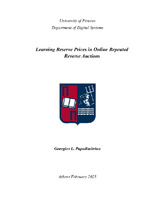| dc.contributor.advisor | Telelis, Orestis | |
| dc.contributor.advisor | Τελέλης, Ορέστης | |
| dc.contributor.author | Papadimitriou, Georgios | |
| dc.contributor.author | Παπαδημητρίου, Γεώργιος | |
| dc.date.accessioned | 2025-03-14T11:48:52Z | |
| dc.date.available | 2025-03-14T11:48:52Z | |
| dc.date.issued | 2025-02 | |
| dc.identifier.uri | https://dione.lib.unipi.gr/xmlui/handle/unipi/17555 | |
| dc.description.abstract | Στην παρούσα διατριβή εμπνεόμαστε από την εργασία των Roughgarden και Wang [1], και εξετάζουμε το πρόβλημα του υπολογισμού reserve prices σε ακολουθίες αντίστροφων δημοπρασιών Vickrey για πολλαπλά αντικείμενα ιδίου τύπου. Ασχολούμαστε με δύο βασικά σενάρια αυτής της κατηγορίας προβλημάτων. Τον υπολογισμό non-anonymous reserve prices, όπου κάθε πλειοδότης λαμβάνει ένα μοναδικό reserve price, και τον υπολογισμό ενός reserve price που ισχύει για όλους τους πλειοδότες. Τα reserve prices που υπολογίζουμε και στις δύο περιπτώσεις αφορούν το σύνολο των αντικειμένων που αγοράζει κάθε bidder. Για το πρώτο σενάριο, παρουσιάζουμε έναν offline αλγόριθμο που επιτυγχάνει θεωρητικό ανώτατο όριο 2 για την αναλογία μεταξύ του «κέρδους» που επιτυγχάνει η βέλτιστη λύση και του κέρδους που εξασφαλίζει ο αλγόριθμός μας, και τον επεκτείνουμε σε online περιβάλλον χρησιμοποιώντας τον αλγόριθμο Follow the Perturbed Leader (FTPL). Για το δεύτερο σενάριο, προτείνουμε έναν offline αλγόριθμο που επιτυγχάνει ανώτατο όριο n για την αναλογία μεταξύ του «κέρδους» που επιτυγχάνει η βέλτιστη λύση και του κέρδους που εξασφαλίζει ο αλγόριθμός μας και τον προσαρμόζουμε σε online περιβάλλον χρησιμοποιώντας το πλαίσιο Multiplicative Weights Update (MWU). Μέσω πειραμάτων αξιολογούμε την απόδοση των αλγορίθμων, χρησιμοποιώντας μετρικές όπως το μέσο ημερήσιο surplus (κέρδος) και το μέσο ημερήσιο regret. Τα bids για κάθε bidder στα πειράματα μας δημιουργούνται με χρήση ενός autoregressive model, ώστε να κάνουμε καλύτερη προσομοίωση ρεαλιστικών συνθηκών δημοπρασιών. Τα αποτελέσματά μας αποκαλύπτουν ότι η λύση που χρησιμοποιεί εξατομικευμένα reserve prices υπερέχουν σε απόδοση έναντι εκείνων που χρησιμοποιούν μία ενιαία τιμή reserve price, όσον αφορά το surplus και το regret. Επίσης, δείχνουμε τη σημαντική επίδραση της ρύθμισης παραμέτρων στην απόδοση αυτών των αλγορίθμων, υπογραμμίζοντας την ευελιξία των μεθόδων μας σε διαφορετικά περιβάλλοντα δημοπρασιών. Επιπλέον, αναπτύξαμε μια τροποποιημένη έκδοση του FTPL, με την ονομασία FTPL-GLPD, η οποία ενσωματώνει δυναμικά ιστορικά δεδομένα, επιτυγχάνοντας καλύτερη απόδοση στις περισσότερες περιπτώσεις των πειραμάτων μας. Η παρούσα εργασία παρέχει ένα πλαίσιο για τον υπολογισμό reserve prices σε δημοπρασίες, ενώ ταυτόχρονα παρουσιάζει και τη σύγκριση μεταξύ ενός αλγορίθμου που υπολογίζει ένα reserve price για κάθε bidder και ενός αλγορίθμου που υπολογίζει ένα reserve price καθολικά για όλους τους bidders. | el |
| dc.format.extent | 69 | el |
| dc.language.iso | en | el |
| dc.publisher | Πανεπιστήμιο Πειραιώς | el |
| dc.rights | Αναφορά Δημιουργού-Μη Εμπορική Χρήση-Όχι Παράγωγα Έργα 3.0 Ελλάδα | * |
| dc.rights.uri | http://creativecommons.org/licenses/by-nc-nd/3.0/gr/ | * |
| dc.title | Learning reserve prices in online repeated reverse auctions | el |
| dc.title.alternative | Εκμάθηση τιμών επιφύλαξης σε άμεσες επαλαμβανόμενες αντίστροφες δημοπρασίες | el |
| dc.type | Master Thesis | el |
| dc.contributor.department | Σχολή Τεχνολογιών Πληροφορικής και Επικοινωνιών. Τμήμα Ψηφιακών Συστημάτων | el |
| dc.description.abstractEN | In this thesis, we are inspired from the work conducted by Roughgarden and Wang [1] to explore the concept of calculating non-anonymous reserve prices in repeated multiunit reverse auctions. More specifically, we address the problem of computing reserve prices in repeated reverse multiunit Vickrey auctions, focusing on two key scenarios: (i) determining non-anonymous reserve prices, where each bidder is assigned a personalized reserve price, and (ii) computing a single reserve price applicable to all bidders. For the first scenario, we introduce an offline algorithm that achieves a theoretical upper bound of 2 for the ratio of the optimum solution surplus over the algorithm’s surplus and extend it to an online setting using the Follow the Perturbed Leader (FTPL) algorithm. For the second scenario, we propose an offline algorithm that achieves n for the ratio of the optimum solution surplus over the algorithm’s surplus, with n being the number of bidders in the auction and adapt it into an online algorithm using the Multiplicative Weights Update (MWU) framework. Through extensive experimentation, we evaluate the algorithms' performance using metrics such as average daily surplus and regret. Bid data for these experiments are generated using autoregressive models to simulate realistic auction dynamics. Our results reveal that solutions with personalized reserve prices outperform those with a single reserve price in terms of surplus and regret. We also demonstrate the significant impact of parameter tuning on algorithm performance, emphasizing the versatility of our methods across diverse auction environments. Additionally, we develop FTPL-GLPD, a modified version of FTPL that incorporates historical data dynamically, achieving superior performance across most test cases. This work provides a robust framework for reserve price computation in online auctions, while drawing a comparison between a solution that computes non-anonymous reserve prices versus a solution that computes one global reserve price. | el |
| dc.contributor.master | Πληροφοριακά Συστήματα και Υπηρεσίες | el |
| dc.subject.keyword | Online machine learning | el |
| dc.subject.keyword | Auctions | el |
| dc.subject.keyword | Multiplicative weights update | el |
| dc.subject.keyword | Follow the Perturbed Leader | el |
| dc.subject.keyword | FTPL by Generically Leveraging Past Decisions | el |
| dc.subject.keyword | FTPL-GLPD | el |
| dc.subject.keyword | Submodular functions | el |
| dc.subject.keyword | Online algorithms | el |
| dc.date.defense | 2025-02-24 | |



